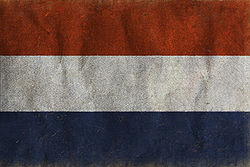United Provinces (ETW Faction)
| United Provinces (ETW Faction) | |
|---|---|
 | |
| Name: | United Provinces |
| From Game: | Empire: Total War |
| Religion: | Protestant |
| Culture: | European |
| Playable: | |
The United Provinces are one of the 11 playable nations in Empire: Total War's Grand Campaign. They are also a major faction in the game.
Overview
The United Provinces, also known as the Netherlands or Holland, had been under Spanish rule for quite some time. However, eventually they declared their independance and defended it with blood and steel. At the beginning of the 18th century, the country is now an independant republic and no longer under Spanish dominance. While their former rulers still hold the region of Flanders to the south, the Netherlands have successfully established themselves amongst the other European powers. The young republic has already become a center of trade and mercantilism. Dutch trade ships reach ever corner of the world and bring the riches of Asia, Africa and America to the European customers. Furthermore, the Dutch have already founded several colonies, ranging from Dutch Guyana in South America to Sri Lanka and possessions in Indonesia.
However, Holland is surrounded by powerful adversaries. Spain is still bitter about the defeat and wants to reclaim its old province. On top of that, Spain's ally France is expanding rapidly and the small republic might seem to be easy prey. In Germany, the smaller states but also kingdoms like Prussia and Austria want to increase their territory and the United Provinces might become a target sooner or later. In India, expansion might be hard for the Dutch since both the Maratha Confederacy and the Mughal Empire are rather powerful. And in America, the Netherlands have to face many already established colonial empires.
Will the small, rich republic be able to overcome its disadvantages? Can traders become the rulers of the known world?
Starting Position
The United Provinces start with the Netherlands in the European theatre, Curaçao and Dutch Guyana in the American theatre and Ceylon in the Indian theatre. The also begin with a trade fleet in the East Indies trade theatre. The Dutch start allied to Great Britain and Austria. They also start with trade agreements with the Mughal Empire, the Maratha Confederacy and Great Britain. Good starting moves for the Dutch are to consolidate control of Flanders - under Spanish Rule - and either Westphalia to the South or Hannover to the East. This will give the Dutch a strong hold over Northern Europe. Wiping out the French by taking Paris early is also a good plan, and allows the Dutch forces in the Carribean and Southern America to take French colonies without being too worried about the situation back home in Europe. Expansion in India is also a lucrative idea, and taking Southern India - especially Mysore - will help fund the expansion in other theatres which do not make as much money as this one. Another easy way of generating funds quickly is to send fleets of Fluyts - the special Dutch trading ship - to either Brazil or the Ivory Coast. This will bring in an awful lot of money to help fund exapansion. The Dutch have a hard starting position at first glance, but a closer inspection shows that a careful choice of alliances can assure the Dutch easy conquest and easy financial gain.
Victory Conditions
Units
The United Provinces field a typical European army, similar to that of the surrounding states. The country's army consists of units such as line infantry, light infantry, hussars, militia and several standard artillery units. Later on, the Netherlands get access to other units such as guards and household cavalry. Since Holland wasn't known for the strenght of its army, most Dutch units are no better than average in quality and strenght. One example would be the republic's line infantry which has a decent defense value but isn't anything special. However, in the Indian theater the Dutch have access to a few unique units. Those aren't much better than average either, though.
The Dutch navy consists of the standard lineup which most other factions share. It includes trade ships, weaker ones such as brigs and sloops but also strong first and second rate frigates, not to mention the Fluyt which is rather cost-effective and strong.
Special Units
The Dutch special units are the Fluyt - a heavily armed trading vessel comparable to a fifth rate ship - and the V.O.C. Infantrymen and Cavalrymen in the India theater. These are independent soldiers who are comparable to Line Infantry or Colonial Line Infantry in the other two theatres of war.